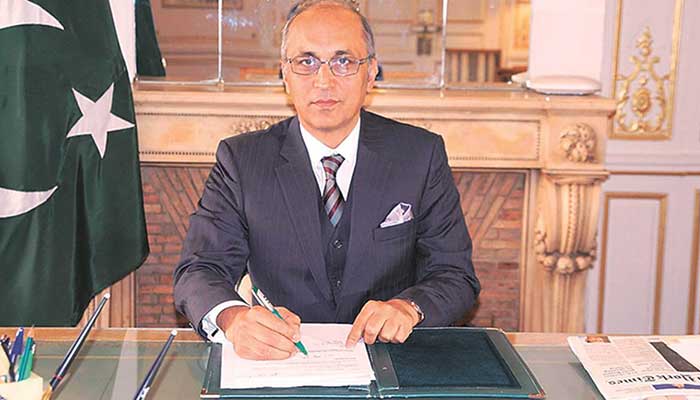Situation in Kashmir has gone beyond “deep concern", says Pakistani envoy
Pakistan's envoy to China says abysmal state of human rights in IoK raises serious questions about India’s claim to be secular
BEIJING: Ambassador of Pakistan to China Moinul Haque has said that the growing international condemnation would force India from illegal acts, as the situation in Indian occupied Kashmir has gone far beyond “deep concern".
As we speak, the military siege of the Kashmiri people by the Indian police state has been ongoing for 365 days, with no end in sight the envoy said in an interview in Chinese paper Global Times.
“This siege includes a communications blackout, closure of educational institutions, bar on religious and public assembly, illegal and arbitrary detention of public figures, forced disappearances and extrajudicial killings of local youth,” he said.
He said, local businesses are closed and economic activity on which the people’s livelihood depends has come to a grinding halt. In recent times, such an inhumane lockdown has no precedence.
India’s ban on media reporting and denial of access to independent observers smacks of its nefarious designs. India’s flagrant disregard of international norms is shocking and simply unacceptable. The continued abysmal state of human rights situation in IoK in the 21st century raises serious questions about India’s claim to be a secular, tolerant and pluralistic society, he added.
Evaluation on the importance of taking urgent steps by the international community to help address the grave situation, he said, the past seven decades of India’s illegal occupation of Kashmir is replete with brutal repression, pseudo-legislative shenanigans and an utter and unilateral disregard for all norms of civilized state behavior.
“The illegal action of August 2019 kick-started another wave of measures to further militarise the region, terrorise the population and enforce a demographic apartheid with the ultimate objective to disenfranchise and subjugate the people of Kashmir,” he added.
Ambassador Haque said, in the immediate term, it is imperative for the international community to realise that by turning a blind eye to the illegal occupation and not listening to the voice of the Kashmiri people will only engender further misery and humanitarian tragedy.
The urgency and importance of the dire situation requires major powers to urge India to reverse its illegal actions of August 5, lift the siege, restore their fundamental rights and honor the promises made to the Kashmiri people by the Indian leadership, he added.
While pointing out specific data/facts regarding India’s consistent pattern of arbitrary arrests, detentions, torture, corporal punishment, extra-judicial killings, and physical and digital lockdown in occupied Kashmir, he said, IoK is no stranger to Indian atrocities where killings, rape, torture, destruction of property are the tools of choice of the Indian occupation forces.
Ambassador Haque said, since the past three decades, around 100,000 Kashmiris have been killed, more than 160,000 civilians illegally detained and more than 100,000 houses destroyed. Thousands of women have been raped and countless children orphaned. For this year alone, around 200 innocent Kashmiris have been killed, around 50 cases of rape and molestation and nearly 1,000 cases of destruction of houses and property have been reported. In addition to that nearly 2,200 civilians have been arrested.
While commenting on Indian attempt to illegally change the demographic structure of the occupied territory, he said that despite the draconian military siege in IoK and almost complete communications blackout, the scale and brutality of India’s military repression in the territory cannot remain hidden in this day and age.
Ambassador Haque said the new domicile law for IoK seeks to systematically change the demographic structure of the occupied territory.
According to some estimates, 1.74 million Indians or 14 percent of the total Kashmiri population could acquire the Kashmiri domicile under the new law, thereby diluting the residency rights Kashmiris enjoyed for centuries, he added.
-
Security forces gun down 30 terrorists in multiple IBOs in KP: ISPR
-
MQM-P calls for new province in Sindh
-
US report validates Pakistan military edge over India: PM
-
Banned TTP poses serious threat to Pakistan security: UNSC panel
-
CM Afridi clarifies remarks on by-poll after ECP requests army deployment
-
Dubai sees 3.2m Pakistani passengers in 2025 as airport sets new milestone
-
Security forces kill 23 Indian proxy terrorists in KP's Kurram
-
Pakistan to construct island to boost oil exploration: report












